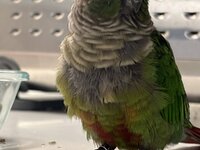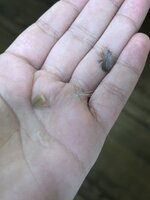It's always good to start with a vet check to rule out health issues. There are a few that can cause plucking.
This area, tho, is classic for behavioral. Because it's not well established, after ruling out health , this is your best time to adjust things and have success
Tell us about diet,share cage set up and location, and share your daily routine with the bird .
Plucking used to be very rare in green cheeks , while other species have more of a tendancey.
Unfortunately how birds are raised and weaned can play a big role . Force weaning lack of social interaction with other chicks and adults . The birds develop insecurities and difficulty dealing with stress. Or other stresses as adults can bring on , neglect and such . Then there are unknown causes , when the bird was raised well , and always cared for well . So I'm not saying you are to blame in any way . But it is a disorder of captivity, not seen in wild individuals. Parrots are so social , active and intelligent.
chronic zinc toxicity has also been linked with plucking.
things that can help , teaching foraging, start as together thing very easy , adjust to their ability. There have been some science studies showing decreased feather destruction behavior in birds that learn to forage.
a healthy diet with a lot of fresh food , more veggies than fruit .
a good routine and set sleep and wake up time. Letting the bird know when you are leaving, and greeting on return.
increased out of cage time . Increasing self directed behavior like bath, flight , climbing, foraging, chewing destroying soft wood and things easy to destroy . Weather permitting, time outside in a very secure cage never left unattended, light shade is best or acres to shade not in direct sun. Being outside is a huge benefit to mood , and their vision in being able to look far , the sunshine vitamin.
knowing my GCC, at least a couple of hours of direct attention .
perhaps a little controversial, if you are able to care for , afford , provide for , and want , a second parrot of same sex and species ..they might not ever get along tho , and would need it's own complete cage set up , and care and time with introducing...I think they really do better with another parrot around. In my personal opinion after having started out with a solo bird fir ten years, then having more , I won't go solo again. Such highly social flock creatures...
that being said many people have happy solo birds
Also I took in a plucker , and she became close friends with another of her species, and continued to pluck for the rest of her life. So adding isn't a cure




